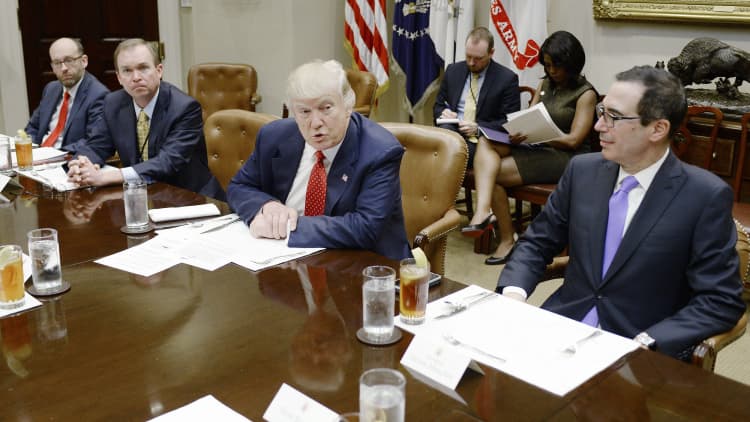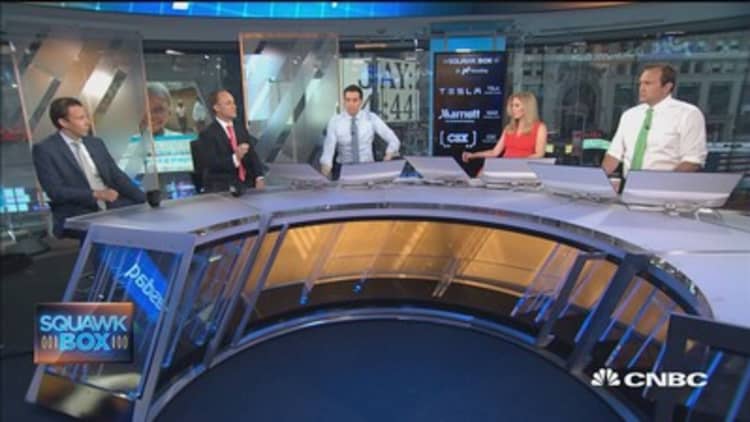
With the current economy chugging along and the markets seemingly functioning on autopilot, tax reform, and certainly tax cuts, might not be the best top priority, according to some economists.
"I don't think that given the strength of the labor market and the tightness of the labor market that the economy needs any fiscal stimulus," said Ed Yardeni, an economist who is supportive of a simplified tax code and lower corporate taxation in general. "It ain't broke so there's no reason to fix it."
Congress left Washington for its summer recess with several items waiting on its return: the debt ceiling, government funding and tax reform chief among them. Administration officials have talked about getting taxes at the top of the agenda before the end of the year.
Yardeni and other economists acknowledge tax reform overall would be a long-term benefit. U.S. corporations face higher taxes than most other parts of the world and the code is complex and riddled with loopholes.
Taking away those loopholes and lowering the rate would free up money to invest in business and possibly encourage more companies to stay in the U.S. rather than seek to move their headquarters abroad.

But there's the question of how much Congress will be able to tackle when it reconvenes. Health-care reform failed after multiple efforts, and the immediate need will be raising the debt ceiling — a legislative block on the amount of money the government can borrow — and passing a spending bill. Both have fall deadlines.
There may be bipartisan support for raising the debt ceiling, but sure enough some lawmakers will use their votes on that as a bargaining chip to push a short-term funding bill that doesn't make significant changes and postpones a bigger policy fight.
If Congress is unable to reach a grand bargain on tax reform, it may default to some tax cuts to at least claim some victory for advancing the administration's agenda. That could spell trouble if cuts are not covered by revenue found elsewhere, economists said.
Market's been fine without tax reform
The promise of tax reform propelled the U.S. stock market higher in the months after the November election, and strong corporate profits have continued to lift it to dizzying heights.
Strong second-quarter company earnings have pushed the Dow Jones industrial average into record territory above 22,000 and the broader up 10.6 percent for the year. A tweet by President Donald Trump last week appeared to claim some credit for the gains, though many analysts and economists point to growth in China and Europe lifting markets, as well as stimulus programs by central banks.
Trump wants to roll back taxes for corporations and individuals, simplify the tax code and spur growth through investment. His plan also envisions 3 percent economic growth — which would be higher than the 1.9 percent growth in the economy through the first half of this year.
Tax reform is crucial to get to that 3 percent number, as House Speaker Paul Ryan told CNBC in June. "Tax reform's absolutely essential for getting faster economic growth that's durable, long-lasting," he said.
The economy added 209,000 jobs in July, according to the monthly report on Friday. Gross domestic product rose at an annualized 2.6 percent rate in the second quarter. Unemployment of 4.3 percent has not been lower in 16 years. The Federal Reserve is raising rates cautiously and probably won't hike them again until the end of the year.
Goldman Sachs economists say unemployment could dip to 3.8 percent, which could put the Fed on track to raise rates once a quarter starting next year even if inflation remains below its 2 percent target.
Stimulus from a tax cut could spark inflation, forcing the Fed to raise rates higher than it might have to keep ahead of the curve. Paul Ashworth, chief U.S. economist at Capital Economics, said it could end up in the situation where the U.S. gets "a deficit-financed tax cut that is dressed up as supply side, and given a fig leaf that it will be funded by economic growth."
WATCH: Trump promises tax cut will be biggest in US history


